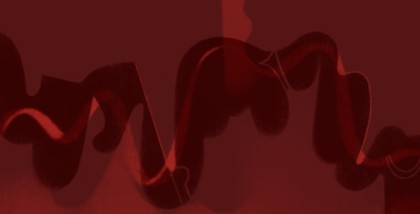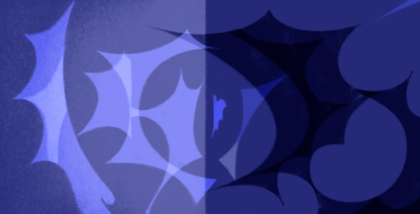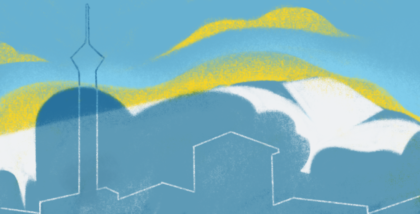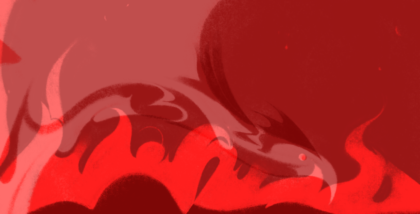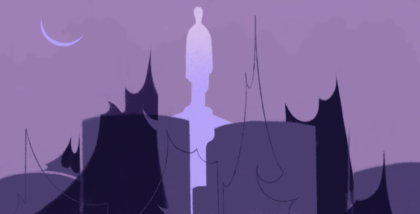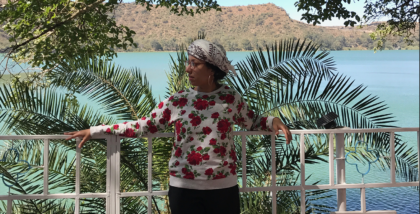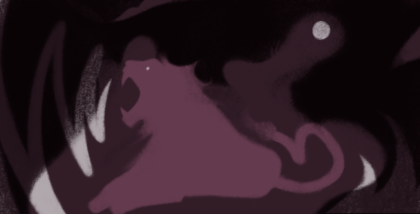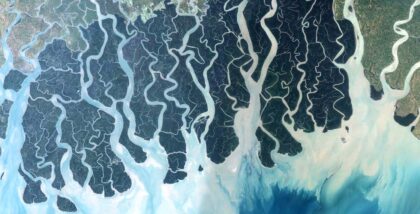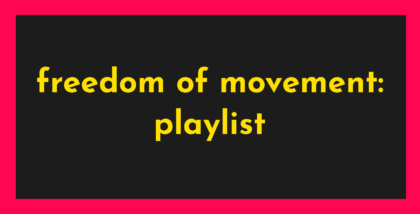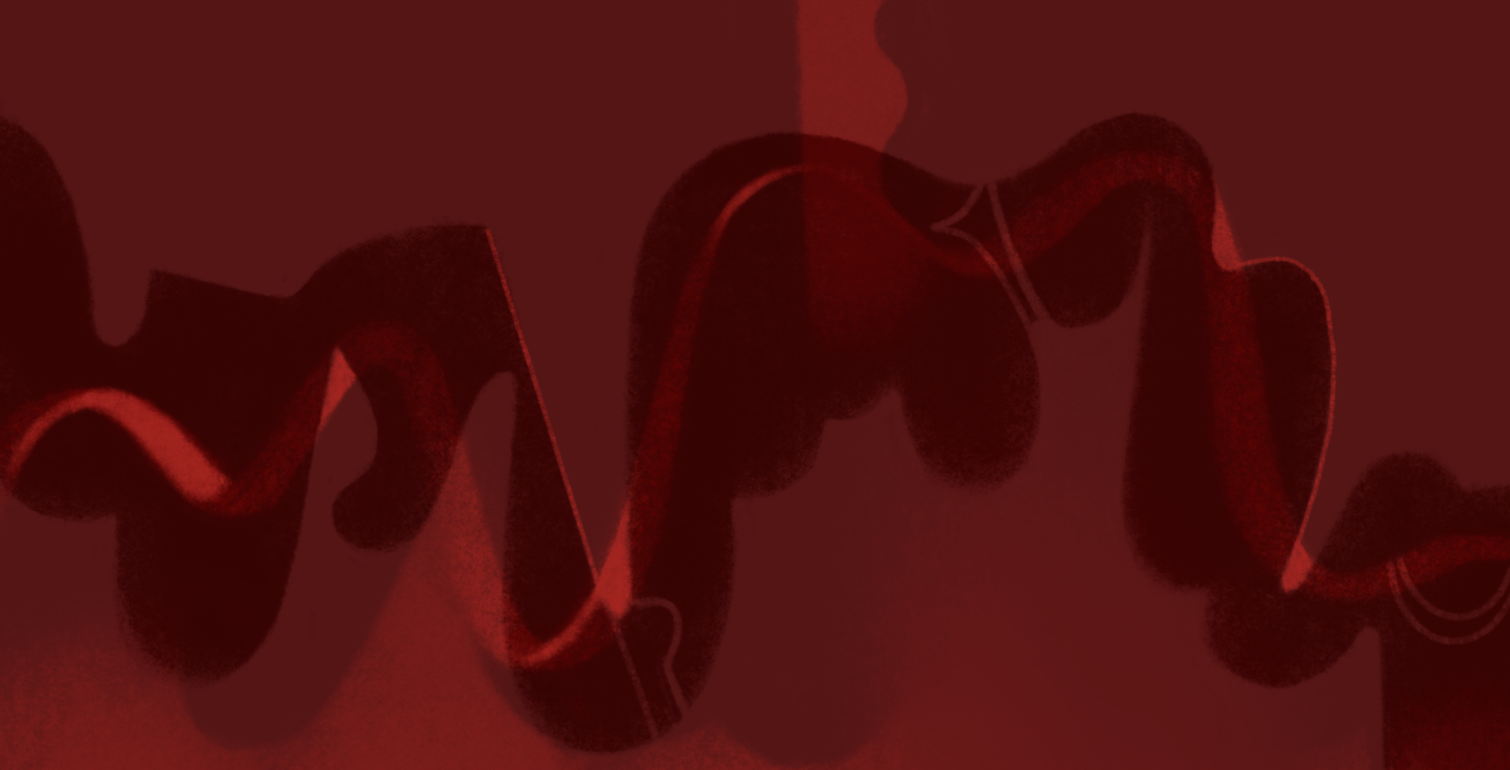 Illustration: Xia Gordon
Illustration: Xia Gordon
When was my first attempt to claim a voice, and whose voice tried to silence mine?
Did the silencing begin in my school in Aleppo? When I was forced to memorize and believe in anything our “eternal leader” said?
Some forms of silencing left marks on my voice; some made me louder.
*
“I see life in sports”
“إني أرى في الرياضة حياة”
I remember my teacher writing on the chalkboard, “I see life in sports.” It was just another quote by our leader, Hafez al-Assad. I didn’t know what was so special about this saying, but I knew it was special by default. Hafez’s photo (and later his son’s photo) hung in every classroom in Syria, decorated our notebooks and grade cards. Every student memorized Hafez speeches as part of our “Nationalism” curriculum. I used to rhyme them with the lyrics of famous songs, scared I might forget them on the tests. I passed year after year with full marks, memorizing his victories, his speeches, and of course, his wisdom.
In fourth grade, a teacher came to our class and asked us to fill out a form to join the Ba’ath party. I didn’t know what being in a political party meant. No one in the party seemed to care. If your family didn’t want you to join the party, the principal would take you to the “private room” and ask questions about what your parents thought.
I didn’t want to go to the private room. I didn’t know what my parents thought. No one in my class dared to say “No.” So it was done. I was officially a member of the ruling party.
In the schoolyard, when the teacher shouted “Who is our eternal leader?” we had to shout back “Hafez al-Assad.”
The only politics I experienced as a Syrian child was loyalty. The only voice allowed was the dictator’s voice.
But maybe the silence started even earlier. Maybe it started with the fear and obedience instilled in each Syrian family. Maybe this was our inheritance.
“Walls have ears”
الحيطان إلها آذان
Before preparing our school lunchboxes with za’atar and cucumber sandwiches, Syrian parents repeated to their kids: “Walls have ears.” This is how they introduced us to the security forces, how they coded language and warned us of going “behind the sun.”
Growing up in Aleppo, I never discussed our constitution and never voted for anyone, although of course I was counted among the 99% of people who elected the president. The only names I knew in our government were those of the officials from the president’s family.
I was in my early 20s when I accidentally stumbled upon a political forum online. Afterward, I couldn’t sleep. I thought for sure the security forces knew I had read the discussions on that forum. They see everything and know everything and now they were coming to take me, I thought. I didn’t know how I knew that I should be scared, but that fear was the most honest feeling I had toward the Syrian state. The fear that night, the idea of “them” taking me into the dark and the unknown just for reading political discussions online, made me realize that I wasn’t apolitical like I claimed. I was just scared. I was born in the cage and it was all I had known. People got arrested for cleaning the streets without security permission, a permission impossible to get. We didn’t dare tell anyone about our ideas because we didn’t know who to trust. Fear was the root of my politics.
I don’t know if my generation chose to be politically involved or whether the politics found us. We learned to use fake names online due to fear, not bravery. Oppression equipped us with the tools of resistance. We learned how to unblock any website, because even Facebook had been blocked. It wasn’t that we wanted to challenge the totalitarian system; the totalitarian system was involved in each aspect of our lives.
Some of us left Syria; many dreamt of doing so.
Those of us who stayed found hope for the first time with the Tunisian and Egyptian revolutions in 2011. We found our voice inside Syria while Tahrir Square chanted:
“The people want to overthrow the regime”
الشعب يريد إسقاط النظام
In the country where “walls have ears,” the streets finally had loud voices. My arm over a complete stranger’s shoulder, her arm over my shoulder, and all of us swaying while singing “Free Free Freedom, we want our freedom! Whether you accept it or not, Bashar, we will gain our freedom!”
Surrounded by thousands, in public, not hiding in secret. Demanding our rights, the ones we knew the Assad dictatorship took from us, and the ones we knew were missing.
We demanded the removal of the emergency law that ruled Syria since 1962, which restricted freedom of movement, forbade public gatherings, and allowed the mukhabarat, the security forces, to arrest and censor everyone and everything. We demanded freedom of the press and political parties. The street was ours and we brought to it, for the first time in recent Syrian history, political debates and ideas.
We discussed what kind of constitution we wanted, how we could preserve nonviolence in the movement, whether a university strike would be effective. We learned about our own racism and classism. I learned about the social problems that the official media claimed we didn’t have, like illiteracy and early marriages. I learned about the history of my city, Aleppo, for the first time. We listened to mothers whose sons and husbands were disappeared in the eighties. For the first time they were able to tell these stories. For the first time we were able to apologize for our ignorance.
We pushed through the fearful silence. Public life was public again. We met each other, we trusted each other, and we met our country.
However, Bashar al-Assad, our so-called “new and modern” president, accused us of being corrupted by the West and greenlit violent responses against the protesters.
If we want freedom in Syria, then the only response we will get is violence. And the more we want it, the more blood it will cost us.
“You want freedom, don’t you?”
“ بدكن حرية، ولا ؟ ”
In March 2012, at the protest marking the first anniversary of the Syrian revolution, I witnessed a member of the shabiha, the regime-backed militia, chanting their famous slogan—“You want freedom, don’t you?”—while hitting a man on the head with a huge wooden stick covered in nails. I froze staring at the blood coming out of that man’s head.
If we want freedom in Syria, then the only response we will get is violence. And the more we want it, the more blood it will cost us.
This sentence—“You want freedom, don’t you?”—along with mocking the protesters by calling them “Freedom People,” was part of the security mentality that was supposed to tame the public into silence again. The security forces couldn’t understand how the generation they had subjected to total censorship was able to question their authority. They didn’t understand why we weren’t whispering when talking about Syria—how we dared to talk about Syria at all. They were outraged when we went into the streets. They would force us to obey, or they would make our punishment as public as possible, so generations beyond would always remember the price of owning their voice. When detention alone failed to silence us, the regime moved forward into war.
One by one, my friends and I were requested for investigations by the security forces and had to flee to the other side of our city, to eastern Aleppo, where we lived under new levels of violence, and where our burgeoning political voices were subdued into the shape of survival.
“Assad or we burn the country”
“الأسد أو نحرق البلد”
In Arabic, this ugly promise has a rhyme: “al-Assad ‘aw nahruq al-balad.” It was the promise used by pro-Assad militias since the early days of the Syrian revolution: either dictatorship or destruction.
Soon after the protests began, the Syrian army started to besiege and bomb cities, and some Syrians took up weapons to defend their neighborhoods. Discussions among human rights defenders and activists shifted from aiming for a democratic future, to emergency response.
My group of friends, who began as a protest coordination unit, gathering in secret to discuss the future of Syria, had to deal with the daily realities of finding a house safe from bombardment. Dialogue about the future became more and more about how we could help children who suddenly lived in danger and without schools. We established our first school and had to learn how to manage it. Others set up hospitals or delivered basic aid.
The war forced political priorities into the background. Survival became our main focus, logistics an overwhelming distraction. Even those who tried to keep voicing political demands were stymied by the scale of need that the violence created. Another school after the last one got bombed; new camps for those who lost their homes; water; shelter. We were jolted back into our basic needs. Our people were suffering, and we felt responsible, even guilty at times.
The more the war intensified, the more localized we became. Going to other cities was dangerous and meant crossing tens of checkpoints. Satellite internet was expensive and electricity was cut off by the regime. They wanted the war to make us isolated and alienated, and that worked. The Syria we had been introduced to in 2011 started to shrink into our own city and even sometimes into our own street.
We had no space to process the present, let alone consider planning for a future. The political narrative that we had restored was paralyzed by procedures.
“Hold back your tongues from criticizing the jihadists”
“كفوا ألسنتكم عن المجاهدين”
In February 2013, a group of al-Qaeda supporters raised a sign in a protest in Aleppo: “All of us are al-Nusra Front.” Along with this sign, they wrote an Islamic phrase, “There is no God but Allah.”
When we objected to those signs, they accused us of defaming Islam. When Abu Mariam, an activist from Aleppo, removed the banners, al-Nusra Front arrested and flogged him with a metal pipe.
Islamists tried to silence the democratic demands of the Syrians from inside the movement, first by claiming their “victimhood” legitimacy. Their members were among the most brutally tortured in Syria since the eighties, after they tried to overthrow Hafez al-Assad. But during our revolution, the regime wanted to manipulate us by creating chaos, hatred, sectarianism, and fear, so they released many of the extremist Islamists from prison and focused mainly on arresting, torturing, and killing the leaders of the Syrian nonviolent movement.
Over time, the Islamists used the holy word as an excuse to kill any political dialogue, deploying the notion that they stood for “the higher cause” to silence any critics or secular voices. They ruled by sharia law and said that one couldn’t criticize what was written by God. They accused the activists of not being radical enough in their battle against dictatorship, mocking us with phrases like, “If you don’t like the Islamists militias, go and create your own Guevara group.” They painted over our freedom graffiti and symbols of revolution, blacking them out with phrases from the Quran and “the Caliphate is coming.”
“Hold back your tongues from criticizing the jihadists,” the supporters of the Islamists used to tell us when we resisted their power. When all of that failed to break the resistance against them, they also turned to violence. They kidnapped, tortured, and killed many who advocated for democracy, and pushed their opposition out of the country. Having already left Western Aleppo for Eastern Aleppo to escape the Syrian security forces, I was among those forced to move again, from Eastern Aleppo to Turkey, to flee the Islamist militias.
Those who stayed had to face multidimensional battles, with the regime’s war weapons, and with extremist Islamists, all the while trying to prove to the world that “we” who resist both forms of violence really do exist.
“But it is not donor-friendly”
“I don’t know how to say this, Marcelle, but I don’t think this proposal is donor friendly,” a UN employee told me during our first meeting in Gaziantep, Turkey in 2014. I didn’t know what she meant.
I had just left Aleppo and was trying to figure out a way to maintain a relationship with the country which had forced me to leave, to refine my voice and my role in the democratization of Syria.
I thought my silly formal suit was donor-friendly enough, and I was still struggling to understand the responsibilities of being an executive manager for an organization—an organization that started as an act of resistance amid the Syrian revolution and morphed into running schools that were under fire and minimally-resourced.
When we mentioned that one of our co-founders, Mustafa, was killed by an Assad airstrike, that was not donor-friendly.
Eventually, I figured out the unwritten rules. When we mentioned in our organizational story the fact that one of our co-founders, Mustafa, was killed by an Assad airstrike, that was not donor-friendly. State violence shouldn’t be referenced; statements should use the passive, nonpolitical voice. “The schools got bombed, the activists got killed,” etc. Naming the perpetrators is considered political if the perpetrator is the state, of course. However, if the perpetrator is an Islamist extremist, naming is encouraged. We must act “neutral” toward the state and overly apologetic regarding our linkages to extremism. The “revolution” should be termed the “conflict,” and the “regime” should be the “government.”
Many of the international organizations working on Syria were pushing for a “neutral” Syrian civil society. This neutrality never meant delivering services to everyone regardless of their political opinion. Rather, it meant being less brave and less opinionated. And at the same time, this “apolitical neutrality” was expected to help solve complicated political problems like lack of female participation in local governance and child recruitment by militias.
Although I didn’t initially understand what donor-friendly meant, I had lived in Syria long enough to recognize when someone is trying to silence my voice. Even if the silencing was happening in English, not in Arabic.
This time, fear wasn’t the silencing power. Rather, we were being silenced by those who controlled the resources and shaped the narratives about what was happening in our country. The international organizations determined our priorities. We, the Syrians, were the “implementing partners” and the “beneficiaries.”
Being “donor friendly” meant writing to a European donor that a school project would prevent a child’s family from fleeing to Europe. If the donor was American, it meant writing that the same school would prevent a first-grade boy from becoming a terrorist.
Fortunately, we didn’t learn how to be donor-friendly. We tried to tell the truth, even if it didn’t appear sensational enough. We were working for a democratic Syria, and we were willing to die for it. We worked with a limited number of schools, and we managed to find allies around the world to support us. We were doing each of our projects not for anyone else’s “security,” but for our own country, for our own future, and we were determined to preserve our own political voice.
However, the term “democracy” started to disappear from the international dialogue about Syria. While the situation became the topic of high-level diplomacy, Syrians rarely would be at the table, and their political rights were rarely discussed. The meetings with Syrians were about “tolerance,” “countering violent extremism,” and “peace.”
Many of the foreigners who worked on the “Syrian issue,” tried to “civilize” us, teach us how to listen to each other. Hundreds of trainings and workshops focused mainly on amnesty, communication, and negotiation skills. What the international organizations thought of as inclusion was in fact limiting us only to our religious and ethnic identities. They ignored the systemic oppression and absence of the rule of law, focusing instead on the conflict among “us,” the Syrian people. They ignored the fact that the main problem wasn’t that we were not listening to each other; the problem was that the mukhabarat were determining the parameters of our dialogue, listening to each sentence, attacking anyone who dared to have a voice.
When we were invited to the table, it was often to fulfill a gender balance, or any other balance in mind. Syrians rarely decided the topic and agenda. I had the luxury of being tokenized twice, as a woman and as a “local” who speaks English.
I couldn’t be that kind of “neutral.” I had seen friends killed just because they dreamt of the ability to talk about Syria freely.
I didn’t want to be “neutral.” I didn’t want to lose this small space of freedom that we paid a huge price for, the freedom to own our political narrative.
However, it was not until the fall of Aleppo at the end of 2016 that I surrendered to the scary idea that I might not be able to go back to Syria. It took me more than two years to realize that I was a refugee, and that I am part of what was widely portrayed as:
“The refugee crisis”
However, I fail to recognize my own reflection in the coverage of Syrian refugees. The “Syrian refugee” is flattened into a victim. The “victim” doesn’t want anything besides food and shelter. The “victim” doesn’t have political reasons for leaving their country. Discussions around deporting refugees back to Syria occur casually under the term “return.” “Victims” are traumatized and can’t participate in policy and decision-making. “Victims,” therefore, don’t shape future dialogue about their country, reconstruction, integration programs—or, god forbid, democracy.
Most of the programs that responded to the “refugee crisis” were designed as if there was no Syrian activist to consult, and as if the main problem that prevents refugees from integration is culture shock.
Those programs, and subsequent media coverage, often failed to recognize that survivors fled torture, bombardment, and the loss of loved ones, and that they struggled with legal procedures in the country of asylum. Of course, they failed to recognize that refugees have their own political voices.
Consider the UNHCR website “Searching for Syria,” launched in 2017, which declares that “the world is looking for answers,” and goes on about how happy life used to be in Syria. We had a glamorous life before and then suddenly war happened, everything collapsed. Of course, things miraculously devolved without the slightest mention of state responsibility or its infamous track record of human rights abuses. No wonder, then, that the world couldn’t find an answer.
Sure, the situation in Syria is complicated. Ignoring, simplifying, or imposing denial further intensifies its complexity.
This kind of coverage says a lot about how we are understood as a people. We can’t be fighting for our rights or fighting for democracy; that cannot be true. We are from the Middle East. We fight for sudden barbaric reasons.
When I failed to find my own narrative in the international programs and dialogue on Syria, I decided to quit. I wanted to fulfill my responsibility toward the memory of my country, and to write my own story with my own voice.
I moved to the US and enrolled in an MFA creative writing program. Regardless of how traumatic and dangerous it is to recall memories, I feel responsible for protecting our Syrian stories and sharing them with others. But I usually feel disappointed and sometimes outraged when I finish a speech and someone approaches me with this conclusion:
“But it’s complicated”
As if I need someone to remind me of this basic fact. As if I am not living every detail of my life with this complexity.
Sure, the situation in Syria is complicated. Ignoring, simplifying, or imposing denial further intensifies its complexity. We need to embrace the multilayered political, social, economic, and international aspects of the situation in Syria if we hope to solve it.
As a writer, I still struggle to resist the security forces, Islamists, international community censorship, and my own internal self-censorship.
As a writer from the Middle East, I demand the freedom to criticize my community without this being an invitation for genocide, an extra bullet on the borders, a longer hour for our men at airports, or another travel ban.
I depend on writing as a political act to resist the many forms of silencing, because I sincerely believe that any solution to the symptoms and the roots of the Syrian crisis starts by ensuring that Syrians have our own voices, and the freedom to own our politics.
